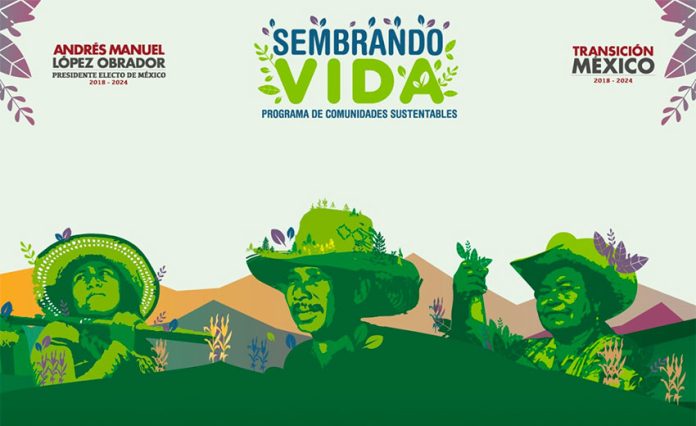I’m often completely flabbergasted at how many things just don’t seem to work around here. To be fair, it’s not just a Mexican problem.
There are plenty of programs around the world that look easy and straightforward and then, upon seeing the results, you find yourself standing around like John Travolta from the Pulp Fiction GIF image with your hands out in the internationally-recognized gesture for “Wait, how did that just happen? Someone explain this to me.”
So let’s have a look at “Sembrando Vida” (Sowing Life), one of those initiatives that probably made you think, “Well at least they’re doing that; that’s very nice.” The idea is that the land in Mexico will be enriched by the presence of more trees, which adds to environmental health, functionality, and beauty, and that farmers will be paid 5,000 pesos a month for doing that important work, which is not bad for what’s supposed to be a part-time gig.
To be fair, I recognize that planting trees is not as simple as it seems. Take it from me: I’m basically the angel of death for plants, and have learned the hard way that it’s a lot more work than just sticking them in a pot and trying to remember to water them enough.
Many of the problems too seem to be practical rather than political in nature: “They include the late distribution of saplings after the conclusion of the rainy season, a lack of water for irrigation, being forced to plant on drought-stricken land, the provision of dead saplings and a shortage of supplies and tools.” If non-farmers, or simply those who are all black thumbs like me are running the show, I can easily see how that would happen.
Furthermore, documents “suggest that the management of Sembrando Vida is based on improvisation rather than being guided by a well-thought-out plan.”
Take it from me, folks: this is no way to run a show. I pretty much constantly prove to myself that improvisation actually does not deserve any place in a wide variety of activities. But it especially doesn’t deserve to get a “strategy” designation when you’re trying to get anything done that’s not a conceptual art project.
So far, so good. These are simply practical problems that can be solved! Moving down in the article, however, you read that farmers are illegally being asked to give money to those program officials that they’re interacting with for vague program needs like “supplies.”
(GIFs are not in the style guide yet for online opinion pieces, but if they were I’d insert one here of someone’s face falling and then dramatically throwing themselves on the ground.)
And sadly, Mexico does seem to have a special talent for planting (Ha! Get it?) corruption in places you wouldn’t ever expect to see it. My face fell further upon seeing that plenty of recipients had been knocked off the rolls for simply collecting the money without actually having done anything, which makes me very pessimistic about this culture’s ability to root out corruption since it makes clear that it’s not just a top-down issue.
The real call to arms for me was when someone cleared a coffee plantation in my home state of Veracruz in order to make space for participation in the program, and that is something that I will not abide. Getting rid of perfectly good coffee trees, to me, is basically the plant equivalent of torturing babies: unforgivable.
But, I’m forever the optimist. Because what other choice do we have? Resignation is not something I’m willing to accept.
So let’s talk solutions. After all, one of my favorite exercises is to propose ways to fix the world that no one in any kind of power will actually read. Here are my proposals:
- A straightforward document, like a “rights” card that farmers can keep on them and whip out when asked to do things they know they shouldn’t be asked. Add a phone number to it as well so they can make a quick call and nip it in the bud right away!
- Put actual farmers and “plant people” in charge of making lists of what needs to get done (give them a salary and a staff, too — trust me, they know what they’re doing!).
- Hire actual logistical experts to be in charge of taking the information given by those growing experts and making sure that it’s implemented in a way that will actually work.
- Make the selection process more clear; who is getting to participate in the program, and why?
- Supposedly this is a 6-day-a-month gig, but many claim they’re expected to work on this full-time. Spell it out: what are some straightforward ways to keep track of the progress that each program worker is making? Let’s figure it out, and do that.
If there’s anything that the coronavirus has taught us over these past few months, it’s that nature is in charge, and it truly does not care about us. Might we try being a bit more humble regarding our stewardship, and stop assuming our human institutions can solve every ill? Suddenly all those old pagan ritual sacrifices to the sun, the earth, the rain, etc., don’t seem like bad ideas.
Sembrando Vida is a good concept for a program. Let’s do it right — we so need a win right now.
Sarah DeVries writes from her home in Xalapa, Veracruz.
